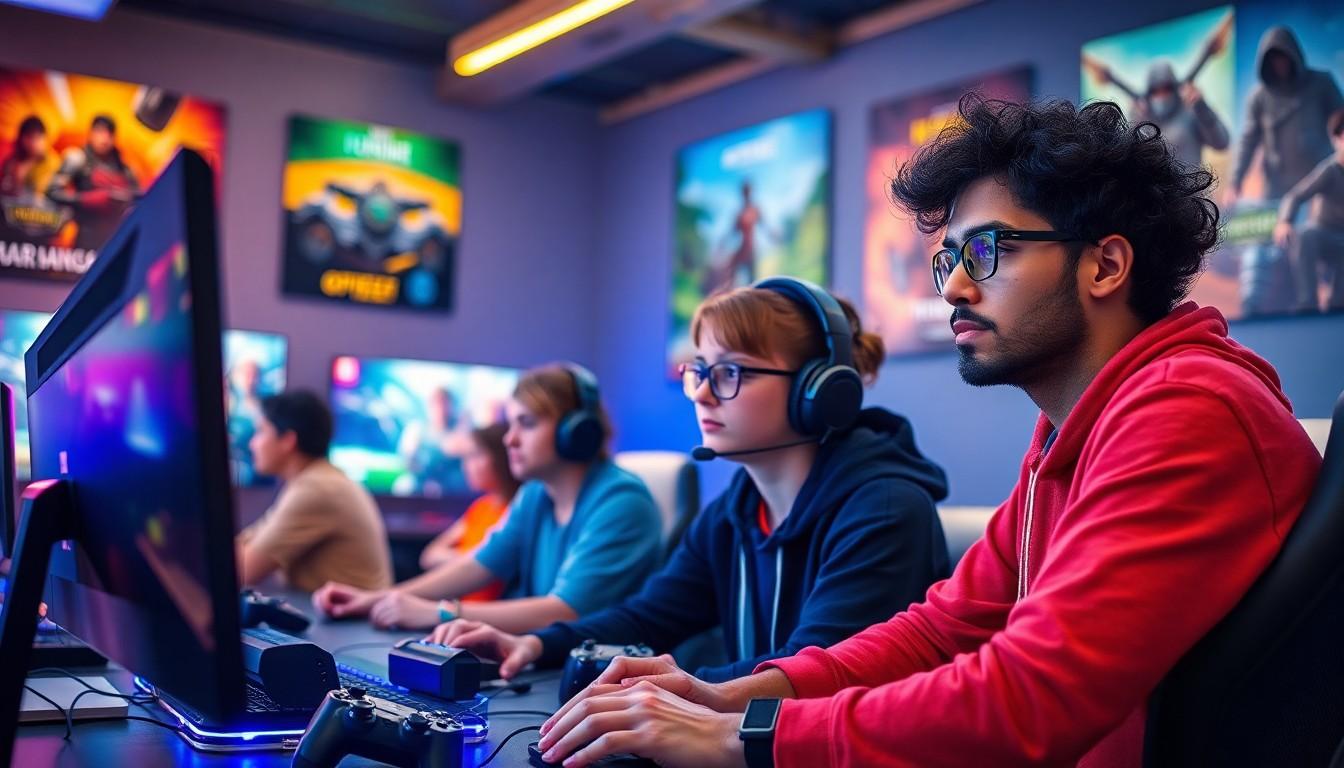Team-Based Multiplayer Games: Unleashing the Power of Collaboration and Strategy

In a world where solo play feels like eating plain toast, team-based multiplayer games are the delicious spread that turns it into a gourmet experience. Picture this: a group of friends strategizing, laughing, and maybe even bickering over who gets the last health pack. These games don’t just offer competition; they create unforgettable memories and epic stories that’ll be retold for years to come.
Team-based Multiplayer Games
Team-based multiplayer games create dynamic environments where players collaborate to achieve shared objectives. These games feature various genres, including first-person shooters, real-time strategy, and sports simulations, which cater to diverse interests. Strategic elements play a significant role, requiring players to communicate effectively and coordinate plans to succeed.
In competitive scenarios, team dynamics influence gameplay. Players often specialize in roles, such as attackers, defenders, or support characters, promoting unique contributions within a group. These designated roles enhance team synergy, allowing players to leverage their strengths.
Community interaction is central to these games. Players form relationships, developing camaraderie that extends beyond the digital realm. As they face challenges together, memorable moments emerge, resulting in lasting friendships and alliances.
Statistics indicate the popularity of team-based multiplayer games. For instance, a survey conducted in 2022 revealed that 65% of gamers prefer multiplayer experiences over single-player options. These figures underscore the appeal of shared gameplay experiences and highlight the social aspect inherent in this gaming style.
Platforms like Steam and Epic Games Store offer a wide variety of team-based multiplayer games. Titles such as “Overwatch,” “Valorant,” and “League of Legends” attract millions of players, emphasizing teamwork in their core mechanics. Gamers frequently discuss strategies and experiences on forums, further enriching the community culture surrounding these games.
Team-based multiplayer games provide engaging experiences that foster collaboration, communication, and social bonds, making them a staple in modern gaming culture. Their continued popularity reinforces the importance of teamwork and shared experiences among players.
Popular Genres of Team-Based Multiplayer Games

Team-based multiplayer games encompass various genres, each offering unique gameplay experiences and teamwork elements.
First-Person Shooters
First-person shooters (FPS) emphasize fast-paced action and precision. Titles like “Overwatch” and “Valorant” require players to work closely to secure objectives. Players choose characters with distinct abilities, enhancing teamwork dynamics. Communication fosters effective strategies, allowing teams to outmaneuver opponents. Each match demands quick reflexes and coordination, creating intense gameplay environments. A 2022 survey indicates FPS games attract a significant portion of the multiplayer gaming community, highlighting their popularity.
MOBAs
Multiplayer Online Battle Arena (MOBA) games focus on strategic gameplay and teamwork. “League of Legends” and “Dota 2” exemplify this genre, where players control unique heroes with specific roles. Teams must collaborate to secure strategic map objectives, including towers and inhibitors. Each match involves detailed planning and coordination, allowing players to execute intricate strategies. Communication between team members plays a critical role in securing victory. Notably, the competitive scene surrounding MOBAs has grown, with professional tournaments attracting massive audiences.
Strategy Games
Strategy games encourage players to think critically and work together to achieve goals. Titles like “StarCraft II” and “Age of Empires” emphasize resource management and tactical planning. Players often take on specialized roles, such as builders or attackers, enhancing team efficiency. Strategic decision-making at various stages of gameplay significantly impacts outcomes. Collaboration and communication ensure the development of effective game plans. The growing popularity of strategy games highlights their appeal among gamers who enjoy cooperative play and strategic depth.
Key Features of Team-Based Multiplayer Games
Team-based multiplayer games thrive on collaboration and communication among players. These games combine strategy, skill, and teamwork to create engaging experiences.

Communication and Coordination
Effective communication boosts team performance. Players share strategies, call out enemy positions, and coordinate attacks. Using voice chat or in-game messaging, they build rapport that enhances gameplay. Teams often establish roles that depend on clear communication. Misunderstandings can lead to failure, so successful teams prioritize consistent dialogue. Strong coordination fosters seamless execution of tactics, allowing teams to adapt to enemies in real-time. Failure to communicate can hinder game flow, making it essential for players to cultivate this skill for victory.
Role Specialization
Specialized roles guarantee strategic depth. Players often choose specific classes or characters that complement their teammates’ strengths. In first-person shooters, roles may include snipers, healers, or support characters. Each role contributes unique skills that enhance team capabilities. MOBA games also utilize distinct heroes, each offering various abilities. This specialization allows players to focus on individual strengths while working toward a common objective. Teams that leverage role specialization maximize efficiency on the battlefield. Success depends on players understanding and executing their assigned roles effectively.
The Social Aspect of Team-Based Multiplayer Games
Team-based multiplayer games excel in creating social connections through shared experiences. These games bring together players from various backgrounds to work toward common goals.
Community and Team Dynamics
Community forms the backbone of team-based multiplayer games. Players frequently engage in discussions through forums and social media, fostering connections that extend beyond the game itself. Dynamics vary based on team composition, with players assigning roles that enhance collaboration. Trust develops as players communicate strategies and adjust to each other’s play styles. Shared victories and defeats create a sense of belonging, reinforcing friendships and camaraderie. Regular participation in games encourages players to form tight-knit groups, often leading to long-lasting relationships.
Competitive Play and Tournaments
Competitive gaming significantly elevates the social aspect of team-based multiplayer games. Tournaments provide platforms for players to showcase their skills, attracting teams from diverse backgrounds. Engaging in competitive play fosters a spirit of rivalry while promoting respect among competitors. Celebrating victories and learning from defeats strengthens team dynamics that create memorable experiences. Statistics show that the esports industry generated over $1 billion in revenue in 2021, reflecting the growing interest in competitive gaming. Events such as the League of Legends World Championship draw millions of viewers and participants, further highlighting the community’s passion for teamwork and competition.
Unforgettable Experiences
Team-based multiplayer games are more than just a pastime; they create vibrant communities and unforgettable experiences. Players thrive on collaboration and strategic gameplay while forming lasting friendships through shared challenges and victories. The dynamic nature of these games encourages individuals to enhance their skills and adapt to their teammates, leading to a deeper understanding of teamwork.
As the esports industry continues to grow, the appeal of these games is undeniable. With a diverse range of genres catering to various playstyles, there’s something for everyone. The connections forged in these virtual arenas often extend beyond the screen, enriching players’ lives and fostering a sense of belonging. In a world where teamwork is essential, team-based multiplayer games stand out as a powerful medium for connection and competition.



